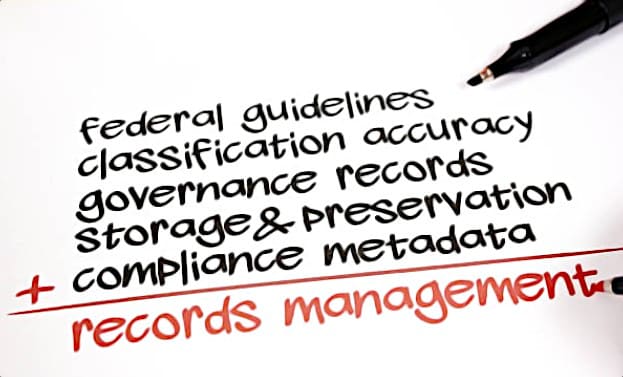A Records Manager is a professional in charge of a company's document management. He or she oversees the management, storage and use of data, while ensuring its security and compliance with current legislation. Find out all you need to know about this essential Data Governance profession!
Records management is an essential corporate practice. It encompasses the archiving policy and systems used to organize and maintain internal documents.
This may involve an automated system for digitally recording files, and storing them in the cloud or on an organization’s internal network. Other companies opt for a manually managed storage system, or a hybrid approach.
The document management cycle can be broken down into five main stages: file creation, use, protection, archiving and destruction. Throughout this cycle, one professional is responsible for the system: the Records Manager.
What is a Records Manager?
The Records Manager is the person responsible for overseeing the system used by the company to organize and maintain its files. He or she ensures that the document management cycle is followed, and that all data is stored and sorted appropriately.
From the creation to the deletion of documents, the Records Manager oversees their maintenance. He or she works closely with the administrative and IT departments, and with the organization as a whole.

What does a Records Manager do? What is the purpose of this job?
The job of Records Manager encompasses a wide variety of tasks. Here’s an overview of the different responsibilities associated with this role.
First and foremost, this expert is responsible for creating new systems for document management, enabling each department to coordinate its file archives. He or she also maintains, evaluates and verifies existing systems.
The Records Manager also coordinates physical and digital document transfer processes. He oversees the storage and digitization of archives. He or she also drafts reports and keeps files up to date. He or she also supervises indexing and classification.
Data protection has become a major issue in business, particularly in the European Union since the GDPR came into force in 2018. It is the responsibility of the Records Manager to ensure the company’s compliance with all legal, financial, administrative and industry standards in terms of data governance.
In addition, he or she implements data protection measures and ensures that they are working. In the event of an audit or compliance check, it is the Records Manager who makes the documents available.
Another responsibility of the Records Manager is the archiving and destruction of old files and documents. Finally, he or she facilitates access to documents and responds to data requests from company employees or customers.
He or she also organizes training courses to promote good data management and storage practices throughout the organization.
The benefits of Records Management
A well-organized document management system enables a company to preserve the security of its archives, and maintain control over access to files and data.
This is a business imperative, not least because of the legal responsibilities associated with data processing. All activities must be documented.
Archives can be used as evidence in the event of legal proceedings, audits or internal meetings. This practice enables the company to comply with industry regulations, while simplifying access to data for authorized users.
Records Management protects information, minimizing the risk of loss or leakage of sensitive data. Redundant storage in multiple locations also simplifies data recovery in the event of a disaster.
An efficient system also saves money by reducing storage and IT equipment costs. And rather than dealing with storage manually, employees can focus on other priority tasks.
It’s also a way of increasing the efficiency of document storage, maintenance and security. The time required to retrieve a file is reduced, as it is no longer necessary to browse through vast volumes of data. This in turn boosts productivity.
By adopting a methodical approach to file creation, use and deletion, the Record Manager limits and controls document volume. This avoids the risk of being overwhelmed by excess.
Last but not least, a document management system enables the company to store files resulting from meetings. These documents can be used at a later date for strategic decision-making. The various parties involved can easily access the archives should the need arise.
Such a system also helps the company preserve its culture and history. Archives can be useful for training new employees, and for commemorating the organization’s values, mission or vision…
What skills does a Records Manager have?

As a rule, a Records Manager has a degree in computer science, library science, business management or data analysis. Some employers require a specialized Master’s degree in Records Management.
Alternatively, you can start out as a Records Management Assistant and work your way up through the ranks as you gain experience.
The main qualities of a Records Manager are organization and analysis, but also communication skills, since it is necessary to interact with company employees and customers.
Administrative experience is a strong asset. This job also requires attention to detail, and the patience to organize the many files and documents in a systematic way.
Last but not least, a flair for problem-solving comes in handy in the event of an archive problem. All these personal qualities complement the indispensable Data Management skills.
To demonstrate your expertise as a Records Manager, you can apply for the Certified Records Manager (CRM) certification offered by the Institute of Certified Records Managers (ICRM).
Conclusion: Records Manager, an essential profession in the age of Big Data
At a time when companies are generating and collecting immense volumes of data, the role of Records Manager has become more important than ever.
It is imperative to ensure that data is protected, that legal compliance is achieved, and that employees in the various departments have rapid access to the files they need.
If you want to acquire all the skills you need for this forward-looking profession, DataScientest is the place to be. Our Data Management training program will acculturate you, teach you how to manipulate data with Pandas, master Business Intelligence with PowerBI, or learn how to formulate SQL queries.
At the end of this 12-week program, you’ll be able to manage a company’s data and ensure that the rules established by the Data Governance program are applied. This course qualifies you for the Tosa Python RS5795 certification, which is registered with the RSCH and recognized by the French government.
Alternatively, we also offer Data Analyst, Data Scientist, Data Engineer and Data Product Manager courses. All our courses can be completed entirely remotely via the Internet, and our organization is eligible for funding from the Compte Personnel de Formation. Discover DataScientest!










